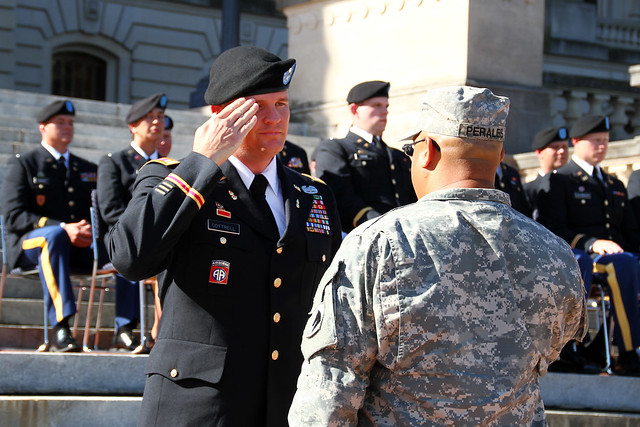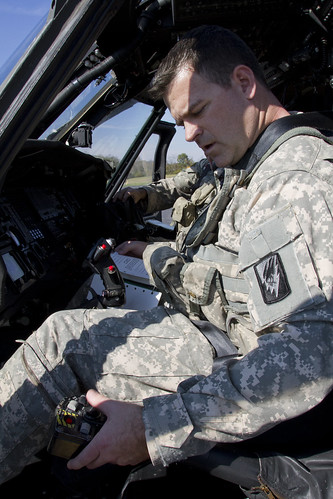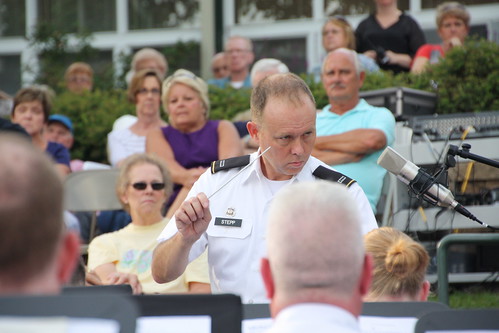Story by David Altom, Kentucky National Guard Public Affairs
[caption id="" align="aligncenter" width="569"]

Warrant Officer William Cottrell receives his first salute from Sgt. 1st Class Ramon Perales during a graduation ceremony fro the Kentucky Guard's newest officers and warrant officers in Frankfort, Ky., Sept. 27, 2014. After several years of service, Cottrell commissioned as a warrant officer through the Kentucky Guard's Warrant Officer Candidate School. (U.S. Army National Guard photo by Staff Sgt. Scott Raymond)
FRANKFORT, KY. -- After nearly 100 years since being established by an act of congress, the warrant officer corps remains a mystery to a good many of us, civilian and military alike. It's been call "the best rank in the Army" as well as the most misunderstood.
Earlier this year we published a top five "mythbusting" article about warrant officers. It turns out there was a lot more about this rank than meets the eye, so we thought it was time to revisit the matter and go for a top ten. Following are the next five truths we thought it was important for you to know.
LINK: Click here to see the first "Top 5 Myths" about warrant officers.
Myth #6: You must have flight experience to become an aviation warrant officer.
[caption id="" align="alignright" width="249"]

A Kentucky National Guard warrant officer inspects cockpit controls of a UH-60 Blackhawk prior to a maintenance test flight in Frankfort, Ky., Oct. 23, 2014. (U.S. Army National Guard photo by Staff Sgt. Scott Raymond)
False: "No, you do not need to have any previous flight experience to become a Kentucky Army National Guard aviation warrant officer," said State Command Chief Warrant Officer Dean Stoops. "All that is required is that you posses the perseverance necessary to complete the application process and the Initial Entry Flight Training Program. It doesn’t matter what MOS you're in now, believe it or not. "
There are some stipulations before you apply, though. You must be at least 18 years old, but not have reached your 33rd birthday by the time you report to flight school. Applicants must successfully pass a Class 1 (warrant officer candidate) Flying Duty Medical Examination (FDME) IAW AR 40-501 and score 40 or higher on the Selection Instrument for Flight Training (SIFT) test. Applicants will be referred to the 63rd Theater Aviation Brigade commander and State Army Aviation Officer for a personal interview.
Myth #7: Army National Guard Warrant Officers must compete for promotion.
False: "Warrant Officers in the National Guard do not compete for promotion like the active component," said Chief Warrant Officer Ryan Turner. "To be considered for promotion to the next higher rank, an Army Guard warrant officer must be in an active status and duty MOS qualified. You also have to be medically fit in accordance with regulation and meet prescribed the height and weight standards."
Turner also said the Soldier must also have completed the minimum years of promotion service indicated in NGR 600-101, table 7-1 and have completed the minimum military education requirements prescribed in table 7-2. In addition, the warrant officer must have a current APFT and must be receive the written recommendation of their immediate commander. And, unlike commissioned officers and enlisted personnel, warrant officers may be promoted up to the grade of CW4 without regard to the standard of grades limitations shown in TOE/MTOE/TDA documents or limitations listed in DA Pam 611-21.
Yes, you are reading this correctly:
Army National Guard warrant officers serving in a CW2 position or higher, may be promoted up to the rank of CW4 as long as all other requirements are met.
Myth #8: You must have a college degree to become a Warrant Officer.
False: According to Chief Stoops, "Although there is a requirement to have some college credits for certain warrant officer jobs, generally there is no requirement to have a college degree or college courses."
Stoops explained that each applicant must demonstrate understanding and proficiency of the English language. An applicant whose native language is not English must achieve a minimum score of 80 on the English Comprehension Level Test. At a minimum, Warrant Officer must be a high school graduate or pass the General Education Development (GED) test.
"Still, we encourage every Soldier to attain higher education for self-development and pursuit of higher learning related to their specific MOS," Stoops said.
[caption id="" align="alignleft" width="375"]

Chief Warrant Officer Greg Stepp conducts the 202nd Army Band during a performance in Covington, Ky., July 5, 2014. Warrant officer positions cover a wide variety of skills and expertise. (U.S. Army National Guard photo by Sgt. 1st Class Steve Baker)
Myth #9: You must accept your appointment to WO1 immediately upon completion of Warrant Officer Candidate School (WOCS).
False: That's a negative, according to Chief Warrant Officer Ricky Skelton, TAC officer with the 238th Regional Training Institute’s warrant officer candidate school.
"Most soldiers assume that they must accept their appointment as a WO1 immediately upon completion of warrant officer candidate school, but this is not the case," said Skelton. "Soldiers who successfully complete WOCS may elect to delay accepting their initial appointment as a WO1 for up to five years, although federal approval will have to be reapplied for prior and received prior to appointment."
Skelton said this is particularly helpful for AGR or technician soldiers who do not have a full-time Warrant Officer position to go into immediately following WOCS, but who want to position themselves to apply for full-time Warrant Officer positions that may come open in the future.
Myth #10: Enlisted Soldiers in the grade of E7, E8 or E9 may be initially commissioned as a CW2.
"Well, not exactly," said Chief Stoops. "Upon completion of WOCS, all Warrant Officer Candidates are temporarily appointed as a WO1 until they complete their warrant officer basic course. However, enlisted Soldiers in the grade of E7 with a minimum of two-years time in grade applying for an MOS that is less than 100% strength, may be promoted to CW2 upon completion of WOBC."
"Enlisted Soldiers in the grade of E8 or E9 may be promoted to CW2 upon completion of WOCS and WOBC without regard to enlisted time in grade," he said.
So there you have it, five more steps toward greater enlightenment about the warrant officer corps. If you think you have something special to offer, you should consider this as the next step in your career. Warrant officers continue to be the Army's technical experts, and as they continue to evolve with future threats and everchanging technologies, they are as dynamic and essential as ever before.
Soldiers interested in obtaining more information should contact Chief Warrant Officer Ryan Turner, Warrant Officer Strength Manager, office: 502-607-6200, mobile: 502-320-3653, or email
ryan.c.turner8.mil@mail.mil.